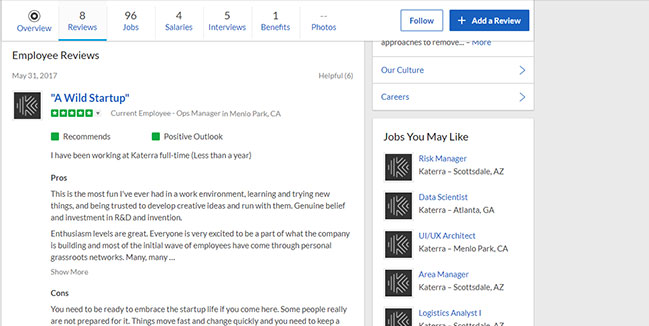Candidates have more influence on the hiring process than ever before. Not only are their fewer job seekers on the market, but the economy is stronger than it was in the past. These factors combine to create a highly competitive recruiting environment for employers — one where top talent is at a premium and job-seekers can be as selective as they want.
This paradigm is pushing many employers to re-evaluate the ways they market to and connect with candidates. Increasingly, companies that adapt their recruiting processes to the new candidate-driven market set themselves up to achieve greater success. And many are following four tips to jumpstart their efforts.
Improve Employer Branding
A positive employer reputation goes a long way in the recruitment process. In the age of the Internet, candidates have numerous resources at their disposal to help them conduct initial research about a company’s reputation. Driven by this research and employer vetting, candidates often make decisions about whether to accept a job offer before it’s even been officially extended. Many may even be actively looking for reasons to say to say no to companies rather than identifying reasons why one might be worth considering. This is why managing and promoting a positive brand image is essential to creating a successful recruitment process.
Social media and platforms like Glassdoor give companies ample opportunity to communicate (and fine-tune) their employer brand. Not only do these platforms give employers the ability to proactively market key elements of their employer brand, including company culture, they also help companies gain insight into how their brand is perceived in the job market. This insight can arm HR teams to make smarter adjustments to how they market their brand to the public.

For more information on the importance of employer branding, check out this new blog post.
Communicate the Full Value of Compensation and Benefits
In the past, many employers pushed salary and monetary benefit offerings as key differentiators throughout the recruitment process. But times have changed. Or, more importantly, candidates have changed.
Many candidates today are motivated by intrinsic benefits like a sense of purpose and work-life integration. This may be due to the large influx of millennials into the job market. Research suggests 60% of millennial employees value a sense of purpose in their work, while 88% want to blend work and life together. By knowing this upfront, employers gain an advantage in understanding which benefits to market during the recruiting process and how to market them.
Despite the rising influence of non-monetary benefits on the candidate mindset, hard cash can still make a difference to job-seekers. Employers just need to make sure they’re offering potential hires a FULL picture of their cash compensation.
As this Forbes article highlights, what many candidates may not realize is that the additional value of a benefits package can run as much as 30% or more. Communicating the full value of monetary compensation (including benefits) in dollars and cents will not only help businesses stand out during the recruitment process, but it will also position a company as transparent and honest — major motivators in today’s job market.
Consider Willingness Over Experience
Experience plays a key role in whether an employer hires a specific candidate. While a candidate with experience in a similar position or industry is often preferable to one with no comparable experience at all, employers shouldn’t discount the importance of a potential hire who demonstrates the ability to learn quickly or adapt to new environments. Sheer moxie can’t always replace a lack of experiential wisdom, but seasoned veterans may bring the baggage of being stubborn, rigid and set in their ways. In this way, employers may find that a less experienced candidate with a high capacity to learn and adapt can offer more long-term value to their company.
Involve Your Employees in the Hiring Process
Asking current employees to participate in the recruitment process can have a massive impact in its overall success. After all, employees want to work with people who are a good fit for the company, not with people whose resumes make them seem like they’d be a good fit.
Involving employees in recruiting can have other benefits, too. Employees involved in the hiring process are often more committed to a new coworker’s development and success. Current employees also have an invaluable boots-on-the-ground perspective about company culture and will be a good gauge of whether a candidate might be potential fit.
Optimizing recruitment is arguably the best way to prevent turnover, which is why continual assessment and innovation of recruiting processes and tactics should be a priority for employers. Improving branding, communicating the full value of compensation, focusing on a willingness to learn and involving employees in the process are all great ways to improve the process of attracting, recruiting and closing top candidates.
Want to learn more about ways to improve recruiting? Discover the benefits of crafting your hiring process with a human focus.


